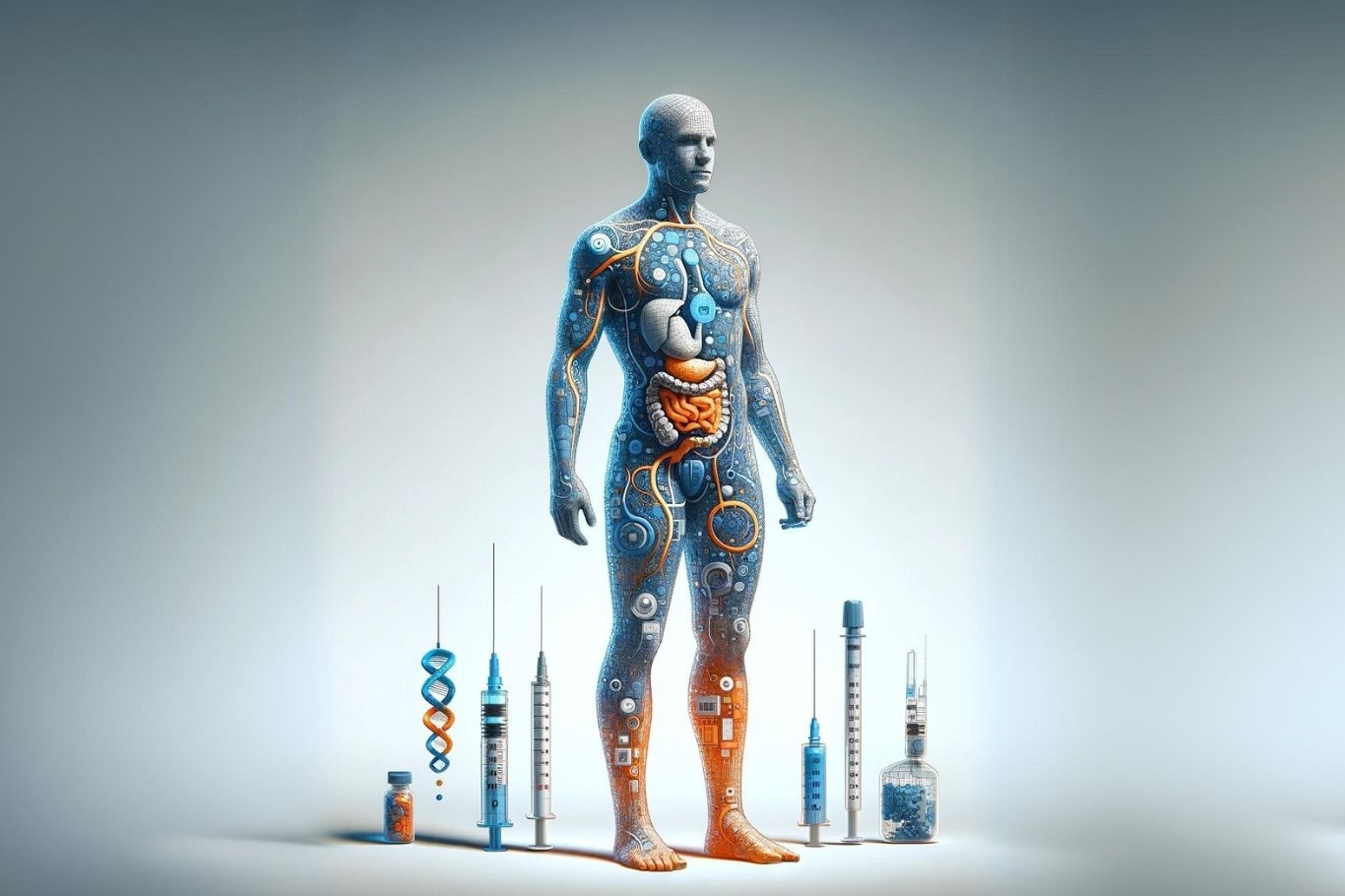Alternative Therapy for Type 2 Diabetes
March 21 2024


In India, there are estimated 7.7 crore people above the age of 18 years are suffering from Diabetes type 2. The average life-time cost of all drugs used in diabetes management is estimated at ₹19,45,135.*
A study shows that 24.6% diabetic patients end up having neuropathy complications, 23.6% have cardiovascular complications, 21.1% renal issues, 16.6% retinopathy and 5.5% foot ulcers.*
What if there was a way to reverse the damage caused and delay progression of Diabetes Type 2 ?
Autologous Cell therapy - commonly known as Autologous Stem Cell Therapy
Autologous Cell Therapy harnesses the body's healing powers using the patient's own cells, particularly cell fractions from adipose tissue or bone marrow. This minimally invasive, ethical approach offers personalized regenerative medicine by tapping into the body's natural abilities for repair, immunomodulation, and tissue regeneration. Sounds complex? Not really! This non-invasive, non-surgical process which takes just 3 hours, has no down time and no known side effects! (Click here to watch a video on what your 3 hour session will look like)
Benefits of Autologous Cell therapy (ACT) for Type 2 Diabetes
ACT has the potential to rejuvenate insulin-producing beta cells and significantly promote organ health by using the body's ability to heal itself rapidly.
- A slowdown in the progression of Type 2 Diabetes,
- A proactive approach to prevent/delay organ damage due to high blood sugar levels
- A boost in insulin production coupled with a decrease in insulin resistance
- Reduction in HbA1c levels
- Reduction in overall blood sugar levels
- Reduction in body swelling & enhanced mobility.
- Quicker wound healing, minimizing the risk of infections and complications.
- Enhanced functionality of organs impacted
When should a Diabetic consider ACT ?
Autologous Cell Therapy is recommended when an individual is experiencing any one of the following -
- HbA1c levels exceed 6.5%
- Fasting blood sugar levels consistently surpass 135 mg/dL
- Blood sugar after meal (postprandial) consistently above 200 mg/dL
Best outcomes from this therapy are most often observed in individuals under the age of 75.
Complete our application form (LINK HERE) to see if you’re a candidate for ACT.
ACT Costs Globally
The price of ACT can differ widely based on various determinants:
- the type of cell fractions used
- the origin of the cell fractions
- the quantity of cells administered
- the cell quality
- the geographical location of the treatment facility.
Typically, the expenses associated with this therapy might span from approximately Rs. 3,00,000 to Rs. 40,00,000 in various centers globally. It's important to note that, as a global practice, the costs for cell therapy are generally not reimbursed by health insurance policies.
Cost at ALIV
At ALIV, we are a social entrepreneurship venture and have done our best to make the therapies financially accessible while maintaining our protocols, standards & results at par with the world.
We use autologous cell fractions which are either bone marrow or adipose derived. The cost of the ACT for Diabetes Type 2 support ranges from Rs. 2,80,000 - 4,00,000 for 3 sessions.
Protocol and Longevity of Results at ALIV
Our protocol for Diabetes Management is 3 infusion sessions - each session 6 weeks apart. The effectiveness of our treatments typically manifests within a 3-6 month period after the last session, with results lasting between 1 to 5 years. Of course this is subjective to the disease's progression rate and the integration of lifestyle modifications for each individual.
The success of these interventions is critically dependent on the precision of the target dosage and the optimal timing of the treatment administration. The majority of our patients over the age of 45 opt for follow-up sessions every 12 months after the initial 3 sessions - to maintain optimal health benefits. View our client testimonials by clicking here.
Click here to see if you are eligible for this therapy.
Why choose ALIV
- Founded in 2016 by a dedicated team of doctors and scientists
- Non-surgical, minimally invasive techniques
- No known side effects from treatments
- Achieves success rates of around 70%
- Certified Laboratory & Center
Committed to transparent protocols and clear pricing
Why Is ACT So Expensive?
Expenses Associated with Cell Fraction Transplantation:
For individuals undergoing autologous cell treatment, the process encompasses several critical stages, including:
- Initial diagnosis
- Extraction of adult cell fractions
- Re-injection of the cells into the patient
- Ongoing monitoring and follow-up after treatment
Additionally, healthcare providers offering autologous cell therapies face substantial operational costs, such as:
- Medical research costs
- Laboratory setup costs
- Disposable and safety costs
- Government approval costs
- Leasing or purchasing medical office space
- Specialized training for medical professionals
- Salaries for support staff
- Administrative expenses
Moreover, the complexity and expertise required to perform these therapies, along with the need for post-treatment care, add to the expenses. In certain instances, practitioners may also incur licensing fees for the use of specific cell fraction sourcing, processing, or application technologies. Collectively, these factors contribute to the high cost of Autologous Cell treatments.
FAQs
What are Autologous Cells ?
Autologous cells are your own cell fractions that target the root causes of ailments by leveraging the body's innate ability to heal itself by rejuvenating or replacing damaged cells and tissues. To know more read our detailed therapy page.
What is ACT?
Autologous Cell Therapy is a way to address the root cause of the disease and alleviate areas of inflammation, regenerate damaged and diseased cells, and modulate the immune system by using the healing abilities of your own cells.
Are Autologous Cells safe?
At ALIV, we prioritise patient safety. It is considered safe as we use only autologous cells, which are extracted from the patient's own body. This minimises the risk of adverse reactions and ensures the highest standards of safety with no known side effects.
How long is the session & how soon can I resume normal activities after the cell therapy?
Each session takes about 3 hours. Most can return to normal activities within a few hours to a couple of days, with post-procedure care instructions and guidance.
How long does it take to see results from Autologous Cell Therapy?
The timeline for experiencing results from Autologous Cell Therapy can vary depending on the individual patient and the condition being treated. Some patients may notice improvements within weeks, while others may require several months or more to experience the full benefits of the procedure.
Are Autologous Cell Therapy results permanent? How many sessions are needed?
Results' longevity varies with the conditions being treated, with some patients experiencing long-lasting improvements, while others may require additional sessions to combat degeneration & maintain benefits. For anti-aging, a yearly session is recommended. For other conditions, typically, 2-3 sessions in the first 3 months are advised, with results observed over the following months.
Can Autologous Cell Therapy cure my condition or just relieve symptoms?
Autologous Cell Therapy promotes revival and repair of damaged cells, which may lead to symptom relief and improved function. However, the extent to which it can "cure" a condition varies. It may significantly improve quality of life or provide temporary relief.
Can Autologous Cell Therapy be used with other treatments?
Yes, it can often be very supportive with physical therapy, medication, or surgery.
What is the success rate?
Success rate depends on the quantity and quality of the cell fractions that we can extract from you. We have a very strict patient selection criteria and will only recommend the therapy if we believe it can benefit you. Because of this 70% of our cases have seen satisfactory results & 20% have seen short lived results.
Is cell therapy covered by insurance?
Coverage for cell therapy depends on your specific insurance plan and the condition being treated. In most cases, insurance does not cover this form of procedure.
Will my cells grow back?
Yes, your body continuously produces cells and replenishes them over the 5 to 7 days post procedure.
Can ACT help lower blood sugar levels?
Yes, one of the key objectives of Autologous Cell Therapy at ALIV is to support the body’s natural ability to lower blood sugar and improve long-term blood sugar control. Many of our patients have experienced a reduction in HbA1c and better glycemic stability after completing the protocol.
Will this lower my blood sugar quickly?
ACT is not an emergency option for how to lower blood sugar fast, but it plays a significant role in long-term glucose regulation. For acute management, consult your primary care physician. ACT is ideal for those looking to manage diabetes at its source over time.
Is this the best treatment for diabetes type 2?
While ACT isn’t a standalone cure, it’s a powerful complement to lifestyle changes and conventional care. Many individuals turn to us while exploring the best treatment for diabetes type 2, especially when traditional therapies plateau or complications begin to arise.
References:
- Kaveeshwar, Seema Abhijeet, and Jon Cornwall. “The current state of diabetes mellitus in India.” The Australasian medical journal vol. 7,1 45-8. 31 Jan. 2014, doi:10.4066/AMJ.2013.1979, Nagarathna, Raghuram et al.
- “Cost of Management of Diabetes Mellitus: A Pan India Study.” Annals of neurosciences vol. 27,3-4 (2020): 190-192. doi:10.1177/0972753121998496
- https://promocell.com/blog/using-mesenchymal-stem-cells-in-regenerative-medicine/